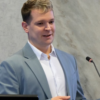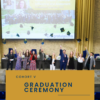
Tom is a thesis and internship supervisor.
How did your journey in teaching begin, and what keeps you passionate about it today?
My teaching journey started formally with the supervision of Bachelor thesis students, while I was doing my PhD at Erasmus University Rotterdam. Since starting my position in Tilburg, I have supervised numerous Master’s thesis students and coordinated courses related to strategic HRM, organizational change, and social capital. What excites me about teaching is that it allows me to use my creativity in developing new content for lectures. I also really enjoy interactions with students. I find it rewarding to see when students develop their own ideas and improve their skills throughout a course. It is my mission to develop my students critical thinking and analytic skills, while also making them confident for the next steps in their careers.
What inspired you to pursue a career in research, and what continues to drive your curiosity?
When I was in high school, there was a moment when I wanted to become a journalist because I thought it was fascinating to tell a story and investigate. My work as an academic allows me to do that in a deeper way by engaging with topics for a longer period of time and by using data to tell a story. What still drives my curiosity is trying to uncover the story behind the data and putting it into words that are accessible to different readers.
When you study people and human behavior, what aspects fascinate you the most?
My research is situated at the intersection of proactivity and the social context of work. I am fascinated by understanding how people take initiative and how groups can create a context that enables change. So I guess what fascinates me the most is this interplay between individual agency and the social forces that govern human behavior.
What do you find most rewarding about being in the classroom with students?
I always enjoy the moments when I can use humor to create a more relaxed and open atmosphere in the group. It is also very rewarding to notice the sparks of curiosity when students engage with the topic.
Looking ahead, what topics or trends in your field are you most excited to explore with students?
The world of work is changing a lot, which feels overwhelming to many people (including myself sometimes). This due to the interplay of societal transitions such as digitalization, the aging population, and climate change. In this context, it is important that people become proactive and actively shape these trends within the groups in which they work. I am excited to explore how employees and teams can proactively address these societal transitions (climate change, digital change, demographic change).
In your view, what makes IDA students stand out from others you’ve taught or worked with?
IDA students have strong methodological skills, particularly in the areas of psychometrics and longitudinal data analysis.
Can you share a collaborative project with an IDA student that was especially meaningful or exciting to you?
I am currently supervising a former IDA student in a PhD project on “Playful Work Teams” – This is very fun not only because of the topic but also because of our own humorous interactions 😄
What advice would you give future IDA students who want to make the most of the program?
Try to stay open to different research areas during your internships and thesis trajectory; there is always something to learn. The main skill as a researcher is learning how to connect the dots, so stepping out of your comfort zone can push you to new levels!
What topics are you currently exploring in your work, and what new areas would you love to dive into in the future?
My research spans multiple levels of analysis, what I would like to dive into more in the future is how to connect these different levels. At the individual-level, I lead a research project on how employees can regulate their emotions in the morning by trying to find awe-inspiring scenes on their commute to work. At the team-level, I am particularly interested in understanding how teams can mobilize their resources through collaborative practices, such as agile work practices. At the societal-level, I investigate how the Dutch population feels, thinks, and acts about societal transitions such as climate change, digital change, and demographic change.
Outside of academia, what do you enjoy doing to recharge or spark creativity? (e.g., hobbies)
I have a blackbelt in Judo and train about once a week.
Is there anything else you would like to share? This can also be something personal (e.g. a motto.)
I would like to share with you a principle of Judo called “Jita Kyoie” which is the idea of mutual prosperity. This principle reminds us to be careful not to fall into the excesses of ‘I help you and you prosper’ or ‘you help me and I prosper.’ The only way to have sustainable work environment is when these things are mutual and both parties can prosper. So, in whatever you do, try to focus on actions where both you and others can benefit.












Be First to Comment